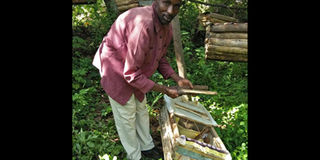Bees take the sting out of bad times with tobacco

Benson Rioba in his farm in Kuria, Migori County where he now practices beekeeping after initially doing tobacco farming. He sells their raw honey to traders from Sirare, Kehancha and Migori markets from Sh300 to Sh500 a kilo. PHOTO | VIVERE NANDIEMO | NATION MEDIA GROUP
What you need to know:
- When bees get food and water close to their hives, they will not travel far in search of them.
- Bees like trees where they get nectar for honey production.
- Bees like places with highly flowering plants.
- Most buyers these days prefer to squeeze the honey from the combs themselves.
On the border of Kenya and Tanzania in Masongora Village, Benson Rioba practises beekeeping.
Rioba, a one-time tobacco farmer who abandoned the cash crop after its fortunes dwindled, owns 300 hives from which he harvests at least 400kg of honey every two to three months.
“I started keeping bees in 2014, investing Sh30,000 after being frustrated by little earnings from tobacco and maize. I had grown tobacco for over 10 years but prices would always drop despite the heavy work,” says Rioba, who keeps bees on his six acres.
The farmer uses the Kenya Top Bar Hives, making them himself from wood and metal.
Inside the hive, he puts bars for hanging honey combs and at the centre, he places a wire mesh to act as an excluder that separates the queen from the other bees.
“This hive is not only easy to construct and repair but also empty the honey combs without disturbing the insects and the honey produced is of high quality as it is harvested without the combs,” he says.
He has placed his apiary on a bushy part of his land full of calliandra plants.
“Bees like trees where they get nectar for honey production. I knew this so I left part of my land bushy and I have also grown a lot sisal plants as bees like their flowers.”
The trees also provide the much needed propolis, which is normally used to fill crevices and cracks in the hives.
He has also constructed a small fish ponds around his apiary to provide water to the bees.
With a good environment, food and water, the 45-year-old says bees would not travel far.
UNSCRUPULOUS TRADERS
“I normally attract the bees into empty hives with a variety of flowering plants. I now know the bee routes and all I do is place empty hives loaded with wax which lure the insects,” says Rioba, who has attended several trainings on beekeeping organised by Migori county government and World Vision.
He harvests the honey early morning or late evening when the bees are less active.
“I use an improvised smoker, which releases smoke around the hive immobilising the insects. Thereafter, I lower the hive, cut combs from the bar about 3cm from the surface and then rub off the bees gently using a twig and collect the honey.”
He sells the raw honey to traders from Sirare, Kehancha and Migori markets from Sh300 to Sh500 a kilo earning him over Sh100,000 every two months.
“There are many unscrupulous farmers and traders who add sugar and molasses to their honey, so most buyers these days prefer to squeeze the honey from the combs themselves. This is the reason I sell the raw honey.”
To ward off ants, which often attack the hives, the farmer has suspended them on tree branches with wires that he regularly coats with old engine oil.
“Bees educate my children and I have also been able to use money I get from the venture to start fish that I keep in eight ponds and arrow roots farming business.”
Kuria East sub-county agricultural officer Booker Oloo says the region is ideal for bee-keeping as it has dense vegetation and readily available water sources.
“This place is rich in several ways as it is bushy and the climate is always favourable for bees. Bees like places with highly flowering plants readily available here.”





